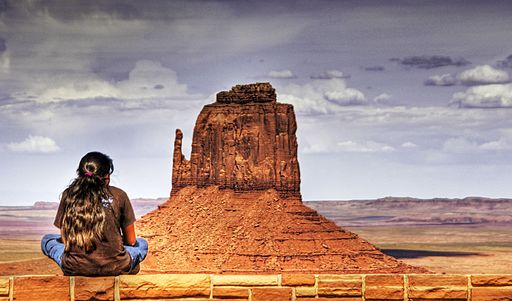Disease Has Never Been Just Disease for Native Americans
By Jeffrey Ostler,
The Atlantic
| 04. 29. 2020
Native communities’ vulnerability to epidemics is not a historical accident, but a direct result of oppressive policies and ongoing colonialism.
As the death toll from COVID-19 mounts, people of color are clearly at greater risk than others. Among the most vulnerable are Native Americans. To understand how dire the COVID-19 situation is becoming for these communities, consider the situation unfolding for the Navajo Nation, a people with homelands in Arizona, New Mexico, and Utah. As of April 23, 1,360 infections and 52 deaths had been reported among the Navajo Reservation’s 170,000 people, a mortality rate of 30 per 100,000. Only six states have a higher per capita toll.
The spread of COVID-19 is reminiscent of previous disease outbreaks that have ravaged Native American communities. Many of those outbreaks resulted in catastrophic loss of life, far greater than even the worst-case scenarios for COVID-19. Even the 1918–19 flu pandemic, in which an estimated 650,000 Americans died (0.6 percent of the 1920 population of 106 million), pales in comparison to the losses Native Americans have suffered from disease.
Read: How the pandemic will end
Until recently, histories of disease and Native Americans have emphasized “virgin-soil epidemics.” According to this theory...
Related Articles
By Kiana Jackson and Shannon Stubblefield, New Disabled South | 02.09.2026
"MC0_8230" via Wikimedia Commons licensed under CC by 2.0
This report documents a deliberate assault on disabled people in the United States. Not an accident. Not a series of bureaucratic missteps. An assault that has been coordinated across agencies...
By Scott Solomon, The MIT Press Reader | 02.12.2026
Chris Mason is a man in a hurry.
“Sometimes walking from the subway to the lab takes too long, so I’ll start running,” he told me over breakfast at a bistro near his home in Brooklyn on a crisp...
By Jonathan D. Moreno, Hastings Center Bioethics Forum | 02.09.2026
When I began to write a book about bioethics and the rules-based international order, the idea that the world was facing the greatest geopolitical change since World War II was uncontroversial for those who were paying attention to such esoterica...
By Zachary Brennan, Endpoints News | 02.23.2026
The FDA is spelling out the details of a new pathway to help speed personalized cell and gene therapies to market for rare diseases.
Monday’s long-awaited draft guidance outlines the agency’s “plausible mechanism” framework, a pathway FDA Commissioner Marty Makary...




